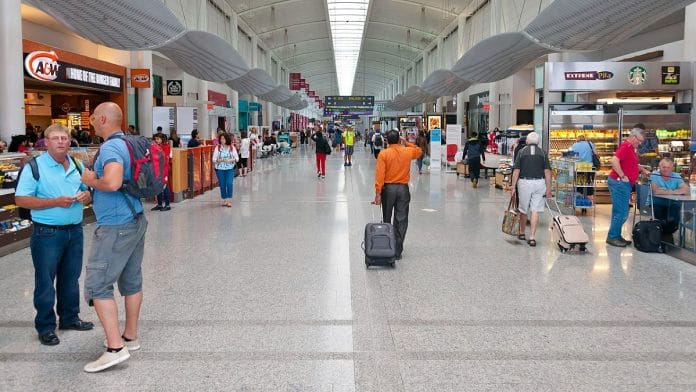New Delhi: When Simran Preet Panesar, a former Air Canada manager, fled to India after orchestrating and executing what is billed as the country’s “largest gold heist,” he probably believed he had left his troubles behind. Never could he have imagined that he could come under probe by an Indian agency for an alleged crime committed in Canada.
A team from Enforcement Directorate (ED) came knocking at his door Friday, as part of simultaneous raids at four places in Mohali and Chandigarh. The raids were being conducted as part of a money laundering investigation, and Preet is charged with conspiring to pull off the “largest gold heist” ever in Canada in April 2023.
An ED team reached his Mohali residence after the agency opened an Enforcement Complaint Information Report (its version of the FIR) Monday, ThePrint has learnt.
The agency opened the case based on its assessment of the gold heist carried out on 17 April 2023 at Toronto’s Pearson airport when a consignment—containing 6,600 bars or 4 quintals of gold worth over $20 million or 2.5 million CAD—was transported in a container on an Air Canada flight from Switzerland and was swindled off with the help of one Brampton man Durante King-McLean.
Just a day earlier, on 16 April, 2024, the US Department of Justice had announced that King-Mclean, Prasath Paramalingam, Archit Grover (all from Brampton) and one other person were charged with a conspiracy in international firearms trafficking.
According to the DoJ statement, King-Mclean, who had illegally entered the US from Canada, was stopped by the Pennsylvania State Police on 2 September, 2023, after several driving violations. However, he fled the spot, and a search of his vehicle led to the recovery of 65 firearms allegedly being planned for smuggling into Canada.
Exactly a year later, in April 2024, the Peel Regional Police in Canada issued arrest warrants against nine individuals for their role in the Pearson airport gold heist, including the trio of King-Mclean, Prasath Paramalingam, Archit Grover, Panesar, Parmpal Sidhu and Amit Jalota on charges such as theft of over $5,000, conspiracy to commit indictable offence and possession of property obtained by crime.
Days later, the Peel Regional Police arrested Jalota, Sidhu, Paramalingam and the other two accused of pulling off a gold heist at the Pearson International Airport.
Later, in May last year, investigators also arrested and charged Grover at the same airport after he flew in from India.
‘Case based on own assessment’
The probe agency has invoked section 2 (1) (ra) of the Prevention of Money Laundering Act after “learning” that Panesar, wanted by the Canadian authorities, may well have brought proceeds of crime to India. This section empowers it to investigate offences committed by Indian individuals with international implications and in general invoked on the request by foreign authorities for cooperation through a mutual legal assistance treaty.
Earlier last year ED, which probes financial crimes in the country, initiated action against two Uttarakhand-based brothers based on a request from the US authorities invoking section 2 (1) (ra) of PMLA, 2002. The brothers Banmeet Singh and Parvinder Singh were accused of operating an international drug racket through a complex network of clients and agents to sell banned substances in the US, UK and other European countries.
In the case of Panesar, however, the ED is yet to receive any formal request for cooperation from the Canadian authorities, sources in the ED said and added that the case has been opened based on its assessment of the two crimes linked with each other through a common set of accused persons.
“An ECIR was opened based on an assessment that proceeds of crime may well have been taken to India in some form or the other. Section 2 (1) (ra) empowers ED to investigate cases that may have originated from abroad and we have reasons to believe that the proceeds of crime generated from the offence may have been transferred to India, which could well be the case in this particular matter,” an ED official said on condition of anonymity.
Section 2(1) (ra) of the PMLA defines the “offence of cross border implications” as follows:
“any conduct by a person at a place outside India which constitutes an offence at that place and which would have constituted an offence specified in Part A, Part B or Part C of the Schedule, had it been committed in India and if such person 2 [transfers in any manner] the proceeds of such conduct or part thereof to India; or
(ii) any offence specified in Part A, Part B or Part C of the Schedule which has been committed in India and the proceeds of crime, or part thereof have been transferred to a place outside India or any attempt has been made to transfer the proceeds of crime, or part thereof from India to a place outside India.”
(Edited by Sudha V.)






